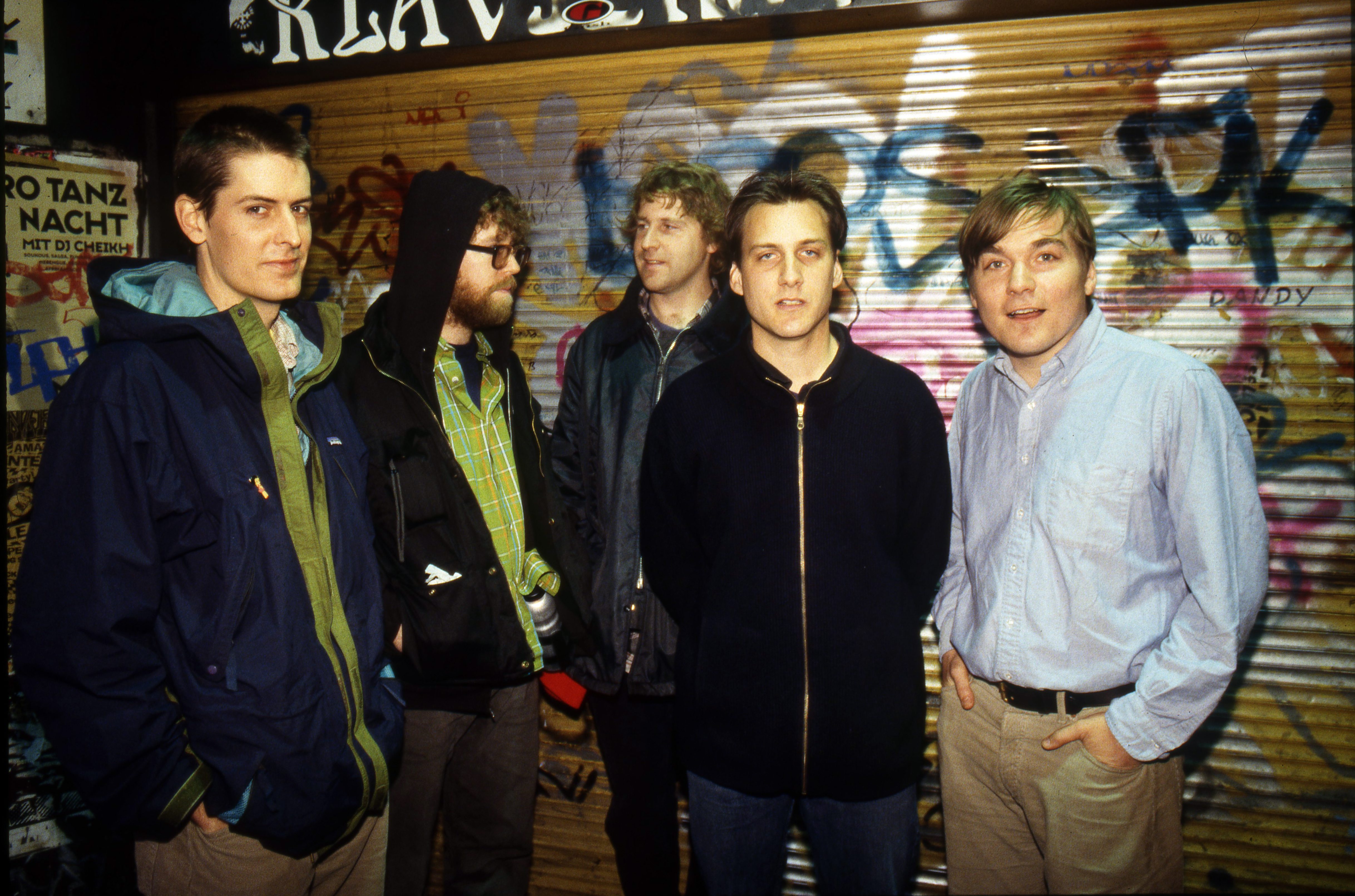Stephen Malkmus—writer of obliquely hilarious and affecting songs, player of slyly sophisticated guitar, possessor of a voice that can make castration sound like the most romantic thing in the world—is the undisputed genius of Pavement. But Malkmus was not the only songwriter, guitarist, or singer in the iconic indie rock band: There was also Scott Kannberg, a quiet foil who usually penned and sang one or two songs per album, but otherwise played a support role to Malkmus’s tunes. (Kannberg was also an important curator, sequencing the tracklist for each of the band’s albums.) Maybe he preferred the background. When Pavement started as an experimental duo in the late ‘80s, both men kept their identities quasi-anonymous. Malkmus eventually began working under his own name, but Kannberg stuck with the pseudonym he took 30 years ago, even after his name was out there. He was always Spiral Stairs.
Last week, Kannberg released We Wanna Be Hyp-No-Tized, his punchy and political third solo album under the Spiral Stairs name. (He also has two more post-Pavement records, recorded with his band Preston School of Industry.) To mark the occasion, we’re looking back at the Pavement songbook and celebrating Kannberg’s contributions, which were featured on every album besides their swan song Terror Twilight. Some are transcendent, others less so. But all are essential to the spirit of the rollicking, freewheeling albums on which they appeared.
“Two States” (Slanted and Enchanted, 1992)

Also Read
Every Pavement Album, Ranked
Early on, Pavement received regular comparisons to English post-punk stalwarts the Fall, which now look sort of quaint within the context of the former’s full career. (“It’s just The Fall in 1985, isn’t it? They haven’t got an original idea in their heads,” Fall frontman Mark E. Smith famously sneered about Pavement’s classic debut Slanted and Enchanted.) Critics seemed to be responding more to a general anarchic sensibility—and to Malkmus’s openness about the Fall’s influence on him in those early days—than they were to the songs themselves, which even at the time of Slanted were already wistful and tender in ways the Fall never approached. One big exception was “Two States,” Kannberg’s lone contribution to the album, which could have been lifted straight from Hex Enduction Hour. Kannberg even apes a distinctly Smith-like northern English accent, shouting over a guitar riff that moves like a brick rolling down a hill. Despite the obvious debt to Pavement’s early heroes, it’s a lot of fun, the best shout-along punk song in their catalog. The weirdly catchy chorus—a boozy chant of “40! Million! Daggers!”—inspired the title of Spiral Stairs’s second solo album.
“Hit the Plane Down” (Crooked Rain, Crooked Rain, 1994)
There’s no getting around this: “Hit the Plane Down” is the weakest of Spiral Stairs’s Pavement songs, and the only skippable track on an otherwise flawless album. By the time of Crooked Rain, Crooked Rain, Malkmus was at a songwriting peak, spinning out sunlit stories of suburban skateboarding and bad haircuts that could go toe-to-toe with the classic rock canon for tunefulness and charm. “Hit the Plane Down,” by contrast, was even blunter and more ragged than much of the previous album, and also less approachable, like a rewrite of “Two States” with all the fiery enthusiasm sucked out. Still, the song sent an important message about Pavement, even as they were approaching something like national success: this band was not interested in cleaning up its act.
“Kennel District” (Wowee Zowee, 1995)
The brilliant, sprawling Wowee Zowee sent the above message home even more clearly. After the critical adulation and encouraging sales numbers for Crooked Rain, the timing was right for Pavement’s mainstream breakout, and they responded with an hourlong collection of strange half-thoughts, free associations, riddles, and left turns—like a stoned mid-’90s version of The Basement Tapes. If Spiral Stairs’ contributions to previous albums positioned him as the committed punk, keeping Malkmus’s explorations rooted in lo-fi weirdness, this is where things started to change. Kannberg has since talked in interviews about a 10-song “classic rock” version of Wowee Zowee that he’d wanted to release, instead of Malkmus’s ramshackle 18-track version of the album. “Kennel District” would have been a clear highlight of this alternate-reality Wowee, a minor masterpiece of fuzzy power-pop that’s as enduring as any Malkmus tune. Instead, its ebuillient melodies are buried near the end of the album, between a post-rock-ish anti-anthem and a fried country song that dissolves into a haze of distorted guitar. Malkmus once said that the songs on Wowee Zowee “sounded like hits” to him because he was so high when he made them. Little did he know, though, that Kannberg had actually written one.
“Painted Soldiers” (Brain Candy soundtrack, 1996)
Or, really, he had written two. “Painted Soldiers,” which appeared on the soundtrack to the Kids in the Hall film Brain Candy, dates to the Wowee Zowee period, and appears on the deluxe reissue, but didn’t make the proper tracklist. That’s just as well, as its tight verses and breezy hook would have sounded out of place on that impressionistic album. The template is similar to “Kennel District,” with a chunky bass line and driving rock rhythm, but the lead vocal is even more straightforwardly poppy. For Pavement, it’s a one-off curio, but you could imagine it being some lesser indie band’s signature track. Still, it doesn’t quite reach the hazy majesty of “Kennel District,” or any of Pavement’s other greatest songs—perhaps because the “woo-hoo-hoo” chorus feels a little too imitative of the pinnacle of ‘90s “woo-hoo-hoo” choruses: Pavement’s own “Cut Your Hair.”
“Date With Ikea” (Brighten the Corners, 1997)
On Brighten the Corners, the sound of Pavement as a whole moved closer to the concise melodic writing Kannberg was doing in the Wowee Zowee era. Perhaps as a result, it’s the first and only Pavement album to feature two of his compositions. The first is “Date with Ikea,” a song very much in the vein of his last two. Unlike “Painted Soldiers,” however, it really soars. The fuzz tone that bassist Mark Ibold seemed to favor for Spiral Stairs songs clashes satisfyingly with crisp guitar arpeggios, and Kannberg nods back at the wry California existentialism of Crooked Rain songs like “Elevate Me Later” and “Unfair”: “The fitness coast is growing near / The shores, they don’t stay blonde this year.” The lyrics of “Date With Ikea” are a little Malkmus-y, but everything else about it—the hyper-saturated instrumentation, the understated catchiness, the way it achieves liftoff with a falsetto chorus—is pure Spiral Stairs.
“Passat Dream” (Brighten the Corners, 1997)
Spiral Stairs’ final addition to the Pavement canon isn’t quite like any of the rest. “Passat Dream” rides variations on the same rhythm and chord progression for its four-minute length, with new bits of sound fading in and disappearing throughout: a wordless falsetto hook that sounds like the shadowy alter ego of “Painted Soldiers” and “Cut Your Hair,” some vaguely Isaac Hayes-ish wah-wah guitar scratches, Kannberg’s detached lead vocal musing about a “price reduction” and a “jingly song.” Rather than injecting a shot of energy, each of these elements just makes the song sound more elegantly bedraggled, more magnificently worn-out, fitting for a band that was nearing the end of its road. “Passat Dream” only lasts four minutes, but it’s a groove that could go on forever.




